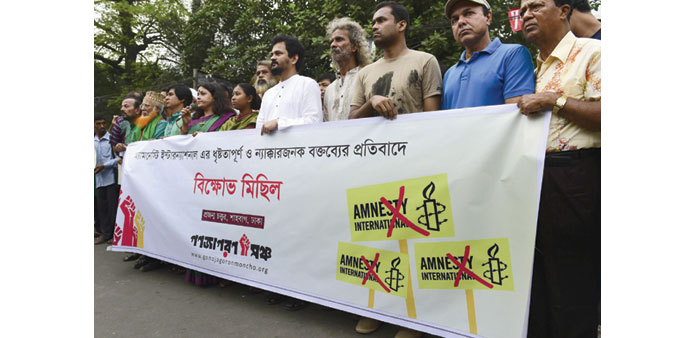PROTEST AGAINST AMNESTY: Bangladeshi secular activists gather to protest against Amnesty International’s statement on war crimes trial in Bangladesh in Dhaka. Amnesty International said that Jamaat leader Ali Ahsan Mohammad Mujahid and Bangladesh Nationalist Party leader Salauddin Quader Chowdhury were sentenced to death by the country’s International Crimes Tribunal (ICT) in 2013 on charges of war crimes and genocide, even though their trials had failed to meet international standards for fair trial.
By Mizan Rahman
Dhaka
The Supreme Court of Bangladesh will resume work from today after around one and a half months’ vacation.
The apex court went into recess on September 20, leaving the division benches of the high court and vacation bench of the Supreme Court chamber judge to deal with the urgent matters.
Meanwhile, the Supreme Court is scheduled to hear three major war crimes cases against Jamaat-e-Islami chief Matiur Rahman Nizami, secretary general Ali Ahsan Mohammad Mojaheed and Bangladesh Nationalist Party (BNP) leader Salauddin Quader Chowdhury, in the first week of this month.
The Supreme Court is scheduled to hear petitions of Mojaheed and Chowdhury on November 2, seeking review of its orders that upheld their death sentences for committing crimes against humanity.
The Supreme Court chamber judge set the date on October 20. Both the convicts lodged their respective pleas on October 14.
Meanwhile, Salauddin on October 19 submitted a petition, pleading to allow as many as eight defence witnesses to testify for him in review hearing.
The eight include former Pakistani prime minister Mohammad Miah Sumro, former Pakistani railways minister Ishak Khan Khakwani, Pakistani Dawn Group chairman Ambar Harun Saigal, Pakistani social activist Munib Arjumand Khan, Viqarunnisa Noon’s grandson Riyaj Ahmed Noon, US diplomat Osman Siddique, Bangladesh High Court Justice Shamim Hasnain and his mother Zinnat Ara Begum.
Though there is no such instance of allowing witnesses to testify during review hearing, the defence emphasised the inherent power of the apex court. The prosecution, however, termed the plea as an attempt to “frustrate the verdict of
the court.”
The Supreme Court is also set to hear the appeal lodged by Jamaat chief Nizami, challenging the death sentence handed down to him by the International Crimes
tribunal (ICT)-1, on November 3.
The court on September 9 adjourned the hearing, leaving the prosecution and defence
arguments incomplete.

